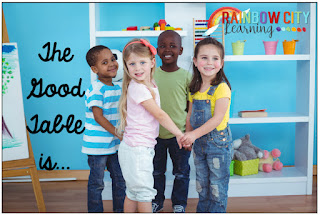Another group of my fourth graders from the "good table" have started high school this week. I've kept in touch with many of them and their parents, so my social media feeds have been filled with the beautiful photos of happy kids off to the next great adventure that life offers. It's always hard to let them go. Year after year, I would watch them walk away in June, sobbing so hard that I couldn't catch my breath. (I'm sure many of you know the feeling!) Wise words always followed from my friend Joannie, a more seasoned and reasonable teacher. "Don't cry. They're making more. And when they're ready, they'll send them!" They always did. They kept on sending them. Most of them were even ready! But it somehow never made me miss the ones who had left any less. I still miss them.
A few weeks ago, one special mom who has become a friend, posted a nursery school picture of her child with a few friends, and then some photos along the way of this group about to enter high school. It made me smile through the tears. I responded, "There are the kids from the good table. Still together! Love it!" Immediately, other moms chimed in with questions about the good table. Were their kids seated at the good table in fourth grade? What is the good table? Is that even a thing?
Yes, friends, the good table is definitely a thing. It's real and it's alive in your classroom even if it is still unnamed. What is the good table? Simply put, it's where the "good" kids sit. It's the table that the teacher smiles at a lot. It's a table where happy and smiling kids are always (Well - almost always. They're kids!) on task. It's your own little Lake Woebegone. (You may need to look this one up!) Kids at the good table feel super comfortable with each other and with you. They don't mind taking risks with their learning and trying out new ideas. They know their friends at the good table will be cheering them on. They exude a confidence that apparently only sitting at the good table can offer!
Through the years, I noticed aspects of the good table showing up, but never really stopped to figure it out. You know how that goes - if things are running smoothly, you don't usually question them. It's when management careens out of control that it gets your attention and desire to analyze it! The year that the good table really made itself known was when this year's shiny new high school freshmen were in fourth grade.
I had always made it a practice to let kids choose their own seats and to stay there for the report card period unless there was an immediate and pressing need to change seats. We had arrived at the end of the first marking period, and I asked for all who wanted a change of seats to stand. My usual practice was that they would then stand behind the seat that they were hoping to move to. If the student in that seat also wanted to move, they would stand and move to another location. It always worked great. No pressure really. If the person in your desired seat didn't stand, you would simply move on to another location. There were usually enough kids seeking a change that the system worked pretty smoothly. When all movement stopped, kids would go back to their former desks and get their supplies to complete the move.
This fourth grade year was different. I should have seen it coming, but it took me by surprise! When the seat-changing movement began, the group of kids at the "good table" formed what looked for all the world like a prayer circle. They held hands and squeezed their eyes shut tightly. They were still doing this when movement stopped. Some were even shaking a little. I didn't count, but I'd say that 3/4 of the remaining students were gathered around the little prayer circle at the good table.
This was the first time I heard the term. When no one was moving, and I explained that they were not compelled to move, the complaints began. "I want to sit at the good table!" "It's not fair that they always get to sit at the good table." And worse. Time for a town meeting.
At the town meeting, it became clear that my students were seeing something very clearly in their own perception that I had failed to see at all. In their unanimous opinion, we had a very specific group of "good" kids in our class and it was their seating opportunity at the "good" table that made them that way. I asked for some clarification on why they thought that a particular furniture setting was such a desirable place to be.
- All the good kids sit there.
- No one bothers them.
- They can get their work done.
- Everyone at their table likes them.
- The teacher likes them best. (That one really hurt, but when you ask for honesty from kids, it's best to be prepared for whatever it is. They tell you exactly how it feels to them.)
Within a week, everyone had discovered the secrets of the life-changing magic of the good table.
- Any table can be the good table.
- The people in any group need to agree on how to treat each other.
- The people in any group need to agree on how they will work together.
- When you smile at someone, they will usually smile back.
- When you treat someone with respect and encouragement, they will usually treat you the same way.
Wishing each of you a year filled with kids from the good table, and wishing my former students a high school experience filled with good table magic!
For more ideas for the beginning of the school year, be sure to check out these posts from Teacher Talk!


























